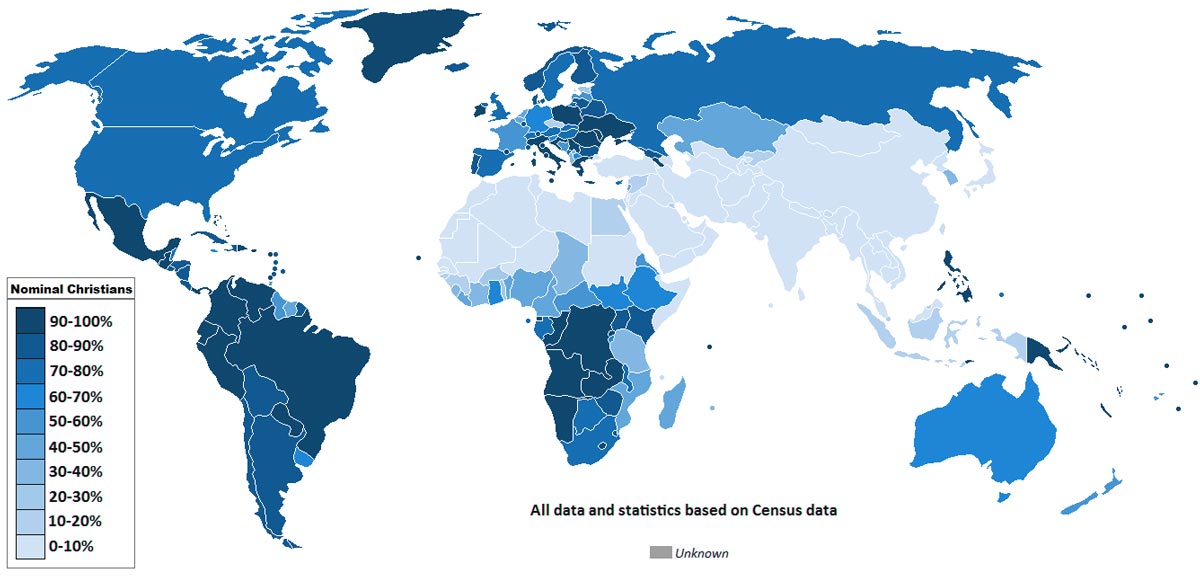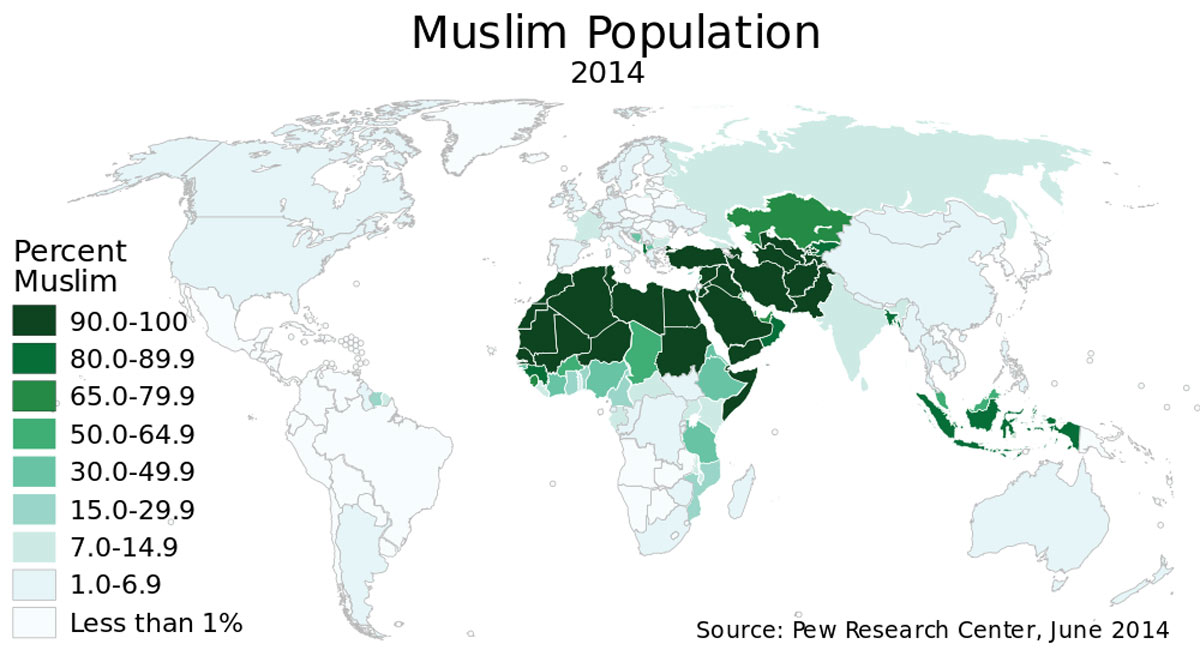The views expressed in our content reflect individual perspectives and do not represent the authoritative views of the Baha'i Faith.
By the year 2070, the demographers say, Islam will overtake Christianity as the world’s largest religion.
As recently as 2010, Christianity was by far the world’s largest religion, with an estimated 2.2 billion adherents, nearly a third (31%) of all 6.9 billion people on Earth at the time. At that point Islam was the world’s second-largest religion, with 1.6 billion adherents, or 23% of the global population.
But a recent demographic analysis of the world’s believers by the Pew Research Center evaluated and projected future changes among the world’s major religions, and found that the overall population of Muslims will grow by 73% between 2010 and 2050, compared to 35% for Christians, the next fastest-growing faith. If those rates of growth continue past 2050, the report found, Muslims will outnumber Christians by the year 2070.
These are only numbers, though, and it’s not a race, despite what some fanatical followers think. This doesn’t mean that huge numbers of people are converting from their former Faith to Islam or Christianity, either. Mostly, birth rates determine the growth of major religions, since so many children inherit their parents’ belief system.
Many people of intellect and faith realize there is, after all, only one religion, the religion of one God, with differing names and practices relevant to the age in which they originally appeared. In that unified and unifying view of religion, one Creator gives humanity a continuous, linked system of spiritual guidance and beliefs, regardless of the names and numbers we attach to them. The Baha’i teachings embrace that unity of thought and oneness of expression:
The fundamental principle enunciated by Baha’u’llah, the followers of His Faith firmly believe, is that Religious truth is not absolute but relative, that Divine Revelation is a continuous and progressive process, that all the great religions of the world are divine in origin, that their basic principles are in complete harmony, that their aims and purposes are one and the same, that their teachings are but facets of one truth, that their functions are complementary, that they differ only in the non-essential aspects of their doctrines and that their missions represent successive stages in the spiritual evolution of human society. – Shoghi Effendi, Summary Statement – 1947, Special UN Committee on Palestine.
You can find many deep concepts contained in this single Baha’i quote, so let’s unpack it a bit.
The “fundamental principle” of the essential oneness of religion enunciated, or proclaimed, by Baha’u’llah, forms the bedrock basis of the Baha’i Faith. Baha’u’llah, Baha’is believe, is the newest, most recent prophet of God, with the power and authority to direct and guide humanity to a fuller understanding of God’s will and purpose.
“Religious truth is not absolute but relative,” expresses the firm Baha’i conviction that religious truth must change as time passes, because the conditions of the world necessarily change. Many, many evils have been perpetrated on humanity by religious leaders who held to only their interpretation of reality, whether material or spiritual. Traditions and rituals to this day are still being performed which are outmoded and archaic in concept and practice, where the original intent and spiritual meaning has been totally lost.
“Divine Revelation is a continuous and progressive process” links all Faiths together as the outcomes of one over-arching, supreme Will. Why would God, the all-knowing, unerring God, send saintly men and women to call all humanity to Himself and His new laws for that age, if it were not a continuous process? Every founder of a great world religion has told us of a future prophet who will come after them. But we have been blind to the inner, spiritual significance of their allusions, and only the next prophet can interpret them for us.
Baha’is believe, as Shoghi Effendi’s statement says, that “All the great religions of the world are divine in origin.” Too many people, even those of great intellect, ignore or dispute this fact, thinking that only their religion is “divine in origin,” and all others are false. After all, what proof is greater for any divine religion than to change a person’s or a whole nation’s “satanic strength” into “heavenly virtues?” Hasn’t the life-changing and character-changing force of religion proven its power over and over again?
The statement goes on to say about all great religions: “… that their basic principles are in complete harmony, that their aims and purposes are one and the same, that their teachings are but facets of one truth, that their functions are complementary.” Those who don’t see this truth may be blinded by love or hate—love of their own beliefs to the exclusion of all other spiritual truth, or hate for anyone who claims to supplant their beliefs with new ones.
Can anyone suppose that the door to spiritual knowledge and wisdom forever closed with the teachings of their own religion? Can anyone believe that no new teacher will ever appear again? Is elementary school or high school or college the end of all learning? Can anyone believe that the revelation and discovery of knowledge itself somehow ends at any given point?
The Baha’i teachings answer no to those questions, and reassure humanity that a new messenger of God has come, with a new message of hope for humanity.
You May Also Like
Comments



















90s% Thailand, Cambodia
80s% Burma/Myanmar
70s% Bhutan
60s% Japan*, Sri Lanka, Laos
50s% Mongolia
40s%
30s% Taiwan*, Singapore
20s% South Korea
10s% China, Vietnam, Malaysia
0s% India, United States*
East Asian countries have varying numbers due to either Communism or a complicated triple religion scenario with Confucianism, Taoism/Shinto/Dao Mu/Musim/Tengrism/etc.
There are two Chinas (China and Taiwan which are the PRC and ROC officially). China is the Communist one and Taiwan is the one that isn't. Low estimates put ...Japan in the 30s and Taiwan in the 20s. America stays in the same category though.
Counts on these scales are of course gross estimates but do show a picture and like all data, trends. Essentially new religions are on the rise and old on the decline.